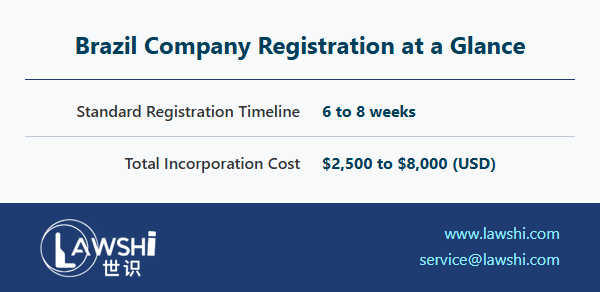Brazil represents one of the most significant economic opportunities in Latin America, boasting the region's largest economy and population. While the country offers substantial market potential across diverse sectors, establishing a corporate presence requires careful navigation of a regulatory environment known for its procedural complexity and formalistic requirements. Understanding the nuances of Brazil's business registration framework enables foreign investors to approach market entry with realistic expectations and strategic preparation.
Brazil's Economic Context and Investment Landscape
As the world's sixth largest economy by GDP, Brazil presents compelling opportunities across multiple sectors including agriculture, manufacturing, technology, and natural resources. The country's hosting of major international events in recent years has stimulated infrastructure development and reinforced its position on the global stage. However, the business establishment process demands methodical planning and awareness of specific regulatory requirements that differ from those in many developed economies.
【Lawshi Professional Insight】
Brazil's regulatory environment, while complex, has undergone significant modernization in recent years. The implementation of digital platforms for business registration and tax compliance has streamlined processes, though the system still requires careful navigation of multiple governmental agencies. Understanding the interplay between federal, state, and municipal requirements is essential for efficient market entry.
Primary Business Structures for Foreign Investors
Limited Liability Company (Sociedade Limitada)
The Limited Liability Company represents the most accessible entry vehicle for international investors, balancing straightforward establishment procedures with operational flexibility. The requirement for minimum two shareholders presents no nationality restrictions, though the mandatory appointment of a Brazilian resident as legal representative necessitates local partnership or professional representation.
The nominal minimum capital requirement of US$1 provides accessibility, though practical considerations typically recommend higher capitalization levels aligned with planned business activities. The anticipated registration timeline of approximately twenty weeks reflects the multi-stage nature of Brazilian business formalization, though specialized guidance can often optimize this process.
【Lawshi Practical Tip】
While the Limited Liability Company structure offers flexibility for most business activities, investors should carefully consider capitalization levels beyond the legal minimum. Brazilian authorities may scrutinize undercapitalized entities, particularly when applying for specific licenses or participating in public tenders. Additionally, the legal representative requirement can be fulfilled through professional corporate services, providing operational control while maintaining compliance.
Corporation (Sociedade Anônima)
Corporations represent Brazil's most formal business structure, essential for financial sector operations and suitable for enterprises contemplating future public offerings. The capital declaration requirement of 10% at establishment provides initial operational resources while demonstrating business seriousness to regulatory authorities.
The governance structure mandates multiple administrators, with residency requirements for foreign administrators ensuring local management presence. This structure's complexity corresponds with its scalability and credibility advantages for substantial business ventures and international operations.
Branch Office Establishment
Branch offices extend foreign parent companies into the Brazilian market without creating separate legal entities. The special authorization requirement from the Ministry of Development, Industry and Trade involves substantive review and historically limited approval rates, making this pathway suitable primarily for specific circumstances involving significant tax advantages in the investor's home jurisdiction.
The operational requirements include name consistency with the parent entity and permanent local representation registration. The extended establishment timeline and comparable costs relative to subsidiary formations typically make branches less attractive than Limited Liability Companies for most international investors.
Strategic Registration Considerations
The average registration timeline of ninety days reflects Brazil's multi-agency approval processes, though specialized legal guidance can significantly influence actual duration. The mandatory local administrator requirement can be fulfilled through various mechanisms, including Brazilian citizens, entities, or foreign nationals possessing permanent residency status.

【Lawshi Exclusive Service】
Our firm provides comprehensive Brazil market entry services, including entity selection analysis, document preparation and authentication, regulatory agency coordination, and ongoing compliance support. We specialize in navigating Brazil's business registration landscape efficiently while ensuring proper understanding of post-establishment obligations including tax compliance, corporate governance, and municipal licensing requirements.
Document authentication represents a critical procedural requirement, with foreign-originating documents requiring notarization, consular legalization, and professional Portuguese translation. The coordination of these authentication steps parallel to other registration procedures can optimize overall timelines when managed strategically.
Post-Registration Compliance Framework
Successful company registration represents only the initial phase of maintaining compliant operations in Brazil. Ongoing obligations include municipal licensing, social security registration, and industry-specific authorizations that vary by business activity and location. The implementation of robust accounting systems aligned with Brazil's electronic tax reporting requirements proves essential from operational inception.
Brazil's tax environment involves multiple layers including federal, state, and municipal obligations, with specialized regimes available for certain business sizes and activities. Proactive tax planning during the establishment phase can yield significant advantages, particularly regarding state-level value-added tax considerations and federal tax incentives for specific industries and regions.
The convergence of Brazil's market potential with its procedural requirements creates an environment where specialized guidance delivers substantial value. By understanding the specific pathways and implementing strategic approaches to corporate structuring, international investors can effectively establish their presence while positioning operations for sustainable growth within Latin America's most significant economy.
